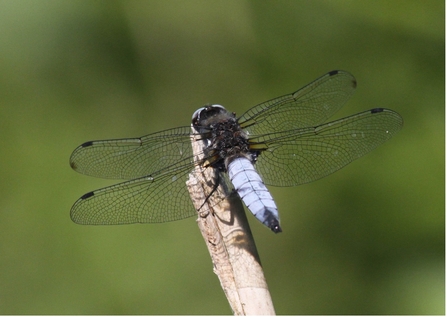Newchurch Moors Nature Reserve, located in the Eastern Yar Valley and owned by Hampshire & Isle of Wight Wildlife Trust, has been assessed as a Priority Site of National Importance for Odonata by the British Dragonfly Society (BDS). This makes Newchurch Moors the first Priority Site for dragonflies on the Isle of Wight. Priority Sites are locally or nationally important areas for certain species, in this case dragonflies. They support rare or threatened species and/or a high diversity of species.
Newchurch Moors attained the status due to its breeding population of scarce chaser dragonfly, a species listed in the British Odonata Red Data Book as ‘Near Threatened’. The dragonflies are typically found in habitats with good water quality and lots of vegetation around water bodies such as ponds or slow-flowing rivers.
The scarce chaser will be on the wing from late April to early August. Males have a powder blue body, while females are yellow. They look similar to some other species of dragonfly, particularly skimmers. The Trust would advise visitors to the site who think they may have seen a scarce chaser to try and take a photo. They can upload their photos and sightings to the iRecord app or website, where they can be verified.
BDS County Dragonfly Recorder, Jim Baldwin, who carried out the assessment, said:
“It is great news that the Isle of Wight has a Priority Site of National Importance for Odonata. It is reassuring that this excellent site is protected and is the result of many hours of survey work, initially undertaken by Dave Dana and latterly by James Gloyn, which provided the necessary scientific evidence. This underlines the importance of regular site recording of Odonata.”
Jamie Marsh, Senior Reserves Manager for Hampshire & Isle of Wight Wildlife Trust, said:
“This is fantastic news for the site and recognition for both the sites management and the survey work carried out by Dave Dana and James Gloyn. The importance of surveys to inform on management is integral to our work. The Trust has been working to improve the conditions for wildlife on site, including controlling water levels, which will lead to better habitats from dragonflies and damselflies. We manage 4kn of riverbank and surrounding wetland habitat in the Easter Yar Valley and we hope our work there will benefit a range of wetland species. ”
Newchurch Moors Nature Reserve was purchased thanks to generous donations to the Trust and a gift in the Will of Gwendolen Bunce. The Trust hopes this new designation helps show how well-managed sites can contribute to a nature recovery network across our two counties. These areas where wildlife can thrive and increase their populations are desperately needed to achieve the Trust’s goal of nature recovering on a third of our land and sea by 2030.

